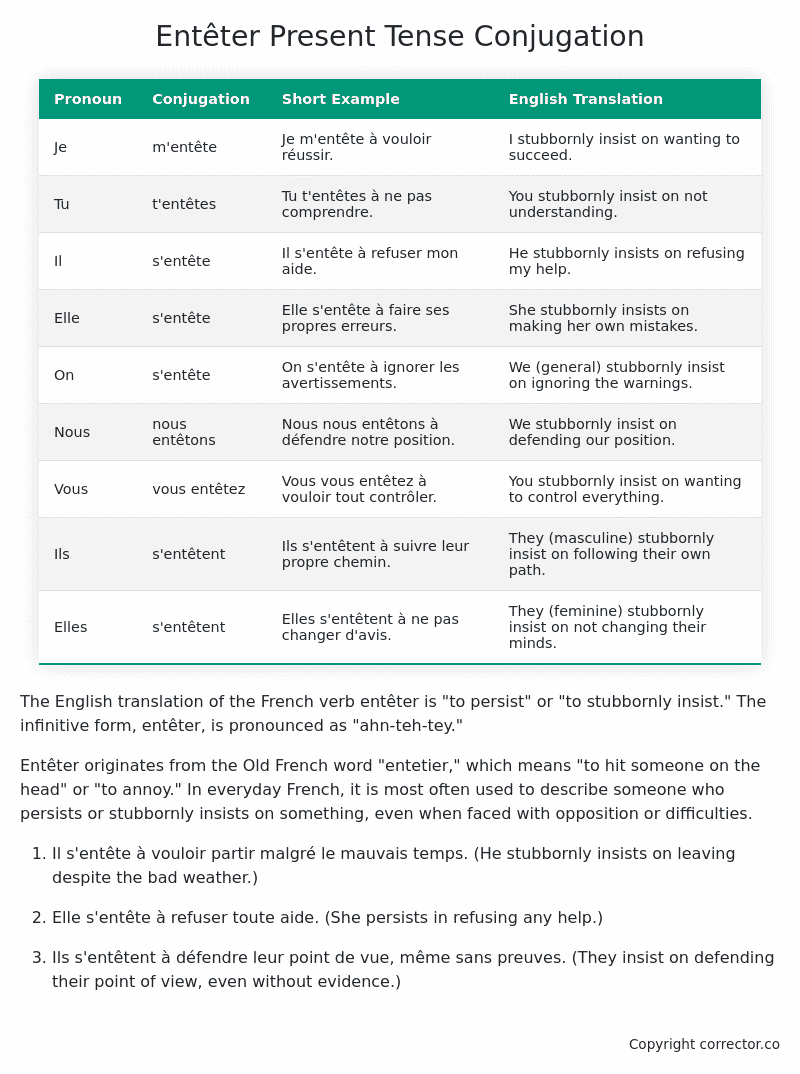Le Present (Present Tense) Conjugation of the French Verb entêter
Introduction to the verb entêter
The English translation of the French verb entêter is “to persist” or “to stubbornly insist.” The infinitive form, entêter, is pronounced as “ahn-teh-tey.”
Entêter originates from the Old French word “entetier,” which means “to hit someone on the head” or “to annoy.” In everyday French, it is most often used to describe someone who persists or stubbornly insists on something, even when faced with opposition or difficulties.
-
Il s’entête à vouloir partir malgré le mauvais temps.
(He stubbornly insists on leaving despite the bad weather.) -
Elle s’entête à refuser toute aide.
(She persists in refusing any help.) -
Ils s’entêtent à défendre leur point de vue, même sans preuves.
(They insist on defending their point of view, even without evidence.)
Entêter – About the French Present Tense
To take a deep dive into all the French tenses then see our article on Mastering French Tense Conjugation.
Common Everyday Usage Patterns For Le Present
Interactions with Other Tenses
Table of the Present Tense Conjugation of entêter
| Pronoun | Conjugation | Short Example | English Translation |
|---|---|---|---|
| Je | m’entête | Je m’entête à vouloir réussir. | I stubbornly insist on wanting to succeed. |
| Tu | t’entêtes | Tu t’entêtes à ne pas comprendre. | You stubbornly insist on not understanding. |
| Il | s’entête | Il s’entête à refuser mon aide. | He stubbornly insists on refusing my help. |
| Elle | s’entête | Elle s’entête à faire ses propres erreurs. | She stubbornly insists on making her own mistakes. |
| On | s’entête | On s’entête à ignorer les avertissements. | We (general) stubbornly insist on ignoring the warnings. |
| Nous | nous entêtons | Nous nous entêtons à défendre notre position. | We stubbornly insist on defending our position. |
| Vous | vous entêtez | Vous vous entêtez à vouloir tout contrôler. | You stubbornly insist on wanting to control everything. |
| Ils | s’entêtent | Ils s’entêtent à suivre leur propre chemin. | They (masculine) stubbornly insist on following their own path. |
| Elles | s’entêtent | Elles s’entêtent à ne pas changer d’avis. | They (feminine) stubbornly insist on not changing their minds. |
Other Conjugations for Entêter.
Le Present (Present Tense) Conjugation of the French Verb entêter (You’re reading it right now!)
Imparfait (Imperfect) Tense Conjugation of the French Verb entêter
Passé Simple (Simple Past) Tense Conjugation of the French Verb entêter
Passé Composé (Present Perfect) Tense Conjugation of the French Verb entêter
Futur Simple (Simple Future) Tense Conjugation of the French Verb entêter
Futur Proche (Near Future) Tense Conjugation of the French Verb entêter
Plus-que-parfait (Pluperfect) Tense Conjugation of the French Verb entêter
Passé Antérieur (Past Anterior) Tense Conjugation of the French Verb entêter
Futur Antérieur (Future Anterior) Tense Conjugation of the French Verb entêter
Subjonctif Présent (Subjunctive Present) Tense Conjugation of the French Verb entêter
Subjonctif Passé (Subjunctive Past) Tense Conjugation of the French Verb entêter
Subjonctif Imparfait (Subjunctive Imperfect) Tense Conjugation of the French Verb entêter
Subjonctif Plus-que-parfait (Subjunctive Pluperfect) Tense Conjugation of the French Verb entêter
Conditionnel Présent (Conditional Present) Tense Conjugation of the French Verb entêter
Conditionnel Passé (Conditional Past) Tense Conjugation of the French Verb entêter
Conditionnel Passé II (Conditional Past II) Tense Conjugation of the French Verb entêter
L’impératif Présent (Imperative Present) Tense Conjugation of the French Verb entêter
L’impératif Passé (Imperative Past) Tense Conjugation of the French Verb entêter
L’infinitif Présent (Infinitive Present) Tense Conjugation of the French Verb entêter
L’infinitif Passé (Infinitive Past) Tense Conjugation of the French Verb entêter
Le Participe Présent (Present Participle) Tense Conjugation of the French Verb entêter
Le Participe Passé (Past Participle) Tense Conjugation of the French Verb entêter
Struggling with French verbs or the language in general? Why not use our free French Grammar Checker – no registration required!
Get a FREE Download Study Sheet of this Conjugation 🔥
Simply right click the image below, click “save image” and get your free reference for the entêter present tense conjugation!

I hope you enjoyed this article on the verb entêter. Still in a learning mood? Check out another TOTALLY random French verb present conjugation!


